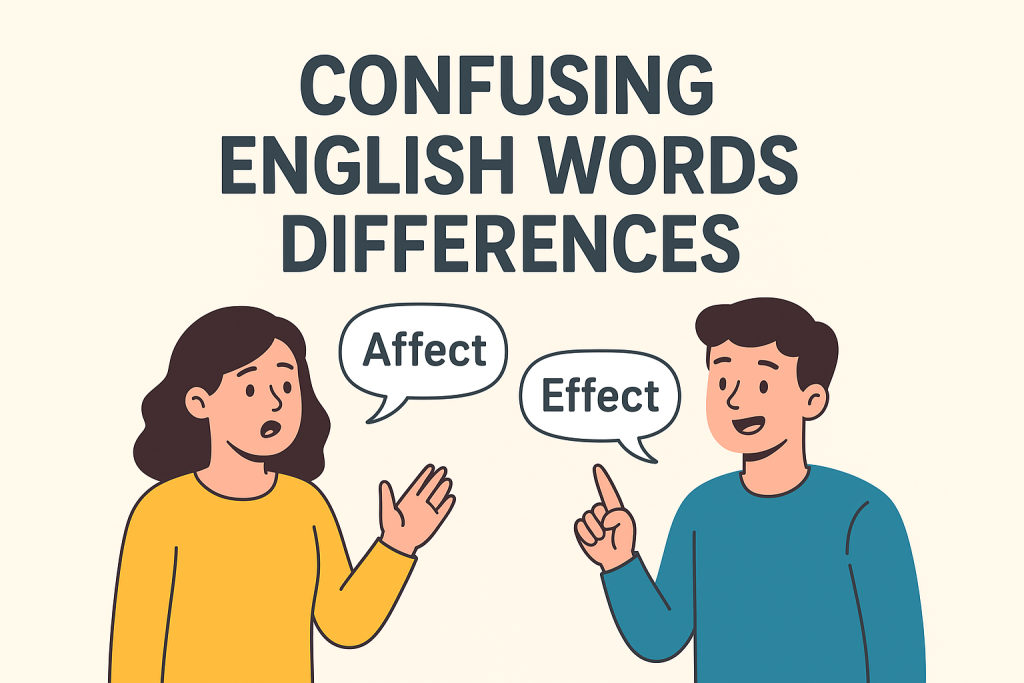Table of Contents
Introduction: What Do We Mean by Confusing Words?
English can be a little tricky sometimes. We often come across words that look almost the same or sound alike, but when you check closely, they don’t mean the same thing at all. These are known as confusing English words.
When people talk about confusing English words differences, they simply mean explaining how such words are different from one another. Knowing these differences is not just about grammar rules – it’s about making sure your message is clear and correct.

Why Is It Important to Learn These Differences?
Have you ever written “effect” instead of “affect” and later realized it completely changed the meaning of your sentence? That’s exactly why learning confusing English words differences matters.
Here are a few reasons why you should pay attention to them:
- You’ll make fewer mistakes in writing and speaking
- You’ll feel more confident while communicating in English
- It’s very useful for exams, interviews, and professional writing
- Even in daily conversations, it saves you from misunderstandings
In short, learning these small details makes a big difference in how people understand you.
25 Common Confusing English Words and Their Differences
To make it easier, here’s a handy table with 25 pairs (or groups) of confusing words and what they really mean:
| Word Pair | Difference / Meaning |
|---|---|
| Affect vs Effect | Affect = to influence, Effect = the result |
| Complement vs Compliment | Complement = completes something, Compliment = praise |
| Principle vs Principal | Principle = rule, Principal = head of a school or main |
| Accept vs Except | Accept = to receive, Except = excluding |
| Stationary vs Stationery | Stationary = not moving, Stationery = paper/office items |
| Advice vs Advise | Advice = suggestion (noun), Advise = to give suggestion (verb) |
| Desert vs Dessert | Desert = dry land, Dessert = sweet dish |
| Loose vs Lose | Loose = not tight, Lose = misplace or not win |
| Their vs There vs They’re | Their = belonging, There = place, They’re = they are |
| Its vs It’s | Its = belonging to it, It’s = it is |
| Then vs Than | Then = time, Than = comparison |
| Among vs Between | Among = in a group, Between = two options |
| Further vs Farther | Further = additional, Farther = distance |
| Ensure vs Insure | Ensure = to make certain, Insure = protect financially |
| Cite vs Site vs Sight | Cite = quote, Site = location, Sight = vision |
| Everyday vs Every day | Everyday = common, Every day = each day |
| Allusion vs Illusion | Allusion = indirect reference, Illusion = false impression |
| Eminent vs Imminent | Eminent = famous, Imminent = about to happen |
| Historic vs Historical | Historic = important in history, Historical = related to history |
| Borrow vs Lend | Borrow = take temporarily, Lend = give temporarily |
| Assure vs Ensure vs Insure | Assure = promise, Ensure = guarantee, Insure = cover by insurance |
| Elicit vs Illicit | Elicit = draw out, Illicit = illegal |
| Affectation vs Affection | Affectation = artificial behavior, Affection = love |
| Cite vs Quote | Cite = reference a source, Quote = repeat words |
| Maybe vs May be | Maybe = perhaps, May be = possibility |
Conclusion
Learning confusing English words differences may look like a small thing, but it can have a big impact on your English. The wrong word can confuse your reader or listener, while the right word makes your sentence shine.
If you want to improve your communication, start by mastering these differences. Practice them in daily writing and speaking, and soon you’ll notice how much smoother your English becomes.
FAQs on Confusing English Words Differences
Q1. What exactly are confusing English words?
They are words that sound similar or look alike but mean different things.
Q2. Why is it important to learn these differences?
Because using the wrong word can change the meaning of a sentence completely.
Q3. How do I remember confusing English words differences?
By practicing with examples, making notes, and using them in real conversations.
Q4. Do exams ask questions on confusing English words?
Yes! Many competitive exams include them in vocabulary or grammar sections.
Q5. How many confusing words should I learn?
Start with 20–30 common ones and slowly build up. The more you learn, the more confident you’ll get.
Checkout 200-synonyms-words-list
